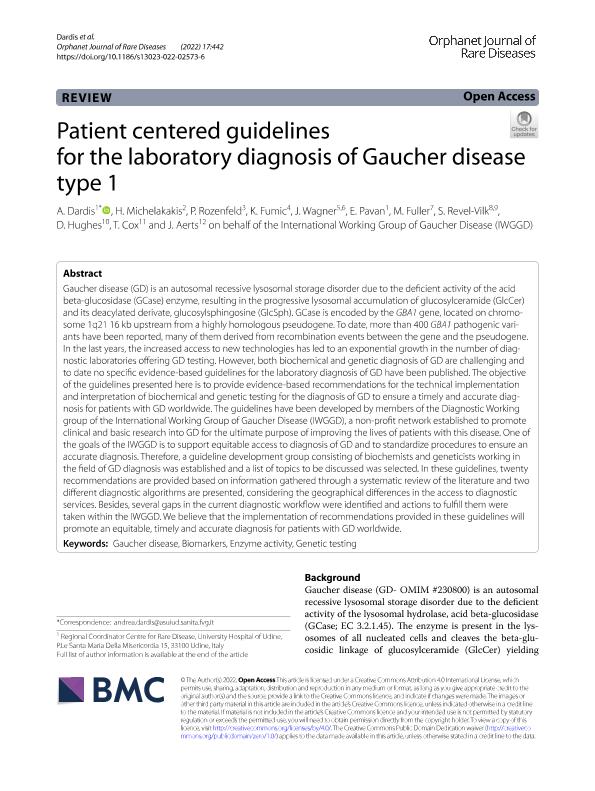Mostrar el registro sencillo del ítem
dc.contributor.author
Dardis, A.
dc.contributor.author
Michelakakis, H.
dc.contributor.author
Rozenfeld, Paula Adriana

dc.contributor.author
Fumic, K.
dc.contributor.author
Wagner, J.
dc.contributor.author
Pavan, E.
dc.contributor.author
Fuller, M.
dc.contributor.author
Revel Vilk, S.
dc.contributor.author
Hughes, D.
dc.contributor.author
Cox, T.
dc.contributor.author
Aerts, J.
dc.date.available
2023-09-26T09:54:59Z
dc.date.issued
2022-10
dc.identifier.citation
Dardis, A.; Michelakakis, H.; Rozenfeld, Paula Adriana; Fumic, K.; Wagner, J.; et al.; Patient centered guidelines for the laboratory diagnosis of Gaucher disease type 1; BioMed Central; Orphanet Journal Of Rare Diseases; 17; 1; 10-2022; 1-17
dc.identifier.issn
1750-1172
dc.identifier.uri
http://hdl.handle.net/11336/212997
dc.description.abstract
Gaucher disease (GD) is an autosomal recessive lysosomal storage disorder due to the deficient activity of the acid beta-glucosidase (GCase) enzyme, resulting in the progressive lysosomal accumulation of glucosylceramide (GlcCer) and its deacylated derivate, glucosylsphingosine (GlcSph). GCase is encoded by the GBA1 gene, located on chromosome 1q21 16 kb upstream from a highly homologous pseudogene. To date, more than 400 GBA1 pathogenic variants have been reported, many of them derived from recombination events between the gene and the pseudogene. In the last years, the increased access to new technologies has led to an exponential growth in the number of diagnostic laboratories offering GD testing. However, both biochemical and genetic diagnosis of GD are challenging and to date no specific evidence-based guidelines for the laboratory diagnosis of GD have been published. The objective of the guidelines presented here is to provide evidence-based recommendations for the technical implementation and interpretation of biochemical and genetic testing for the diagnosis of GD to ensure a timely and accurate diagnosis for patients with GD worldwide. The guidelines have been developed by members of the Diagnostic Working group of the International Working Group of Gaucher Disease (IWGGD), a non-profit network established to promote clinical and basic research into GD for the ultimate purpose of improving the lives of patients with this disease. One of the goals of the IWGGD is to support equitable access to diagnosis of GD and to standardize procedures to ensure an accurate diagnosis. Therefore, a guideline development group consisting of biochemists and geneticists working in the field of GD diagnosis was established and a list of topics to be discussed was selected. In these guidelines, twenty recommendations are provided based on information gathered through a systematic review of the literature and two different diagnostic algorithms are presented, considering the geographical differences in the access to diagnostic services. Besides, several gaps in the current diagnostic workflow were identified and actions to fulfill them were taken within the IWGGD. We believe that the implementation of recommendations provided in these guidelines will promote an equitable, timely and accurate diagnosis for patients with GD worldwide.
dc.format
application/pdf
dc.language.iso
eng
dc.publisher
BioMed Central

dc.rights
info:eu-repo/semantics/openAccess
dc.rights.uri
https://creativecommons.org/licenses/by/2.5/ar/
dc.subject
BIOMARKERS
dc.subject
ENZYME ACTIVITY
dc.subject
GAUCHER DISEASE
dc.subject
GENETIC TESTING
dc.subject.classification
Genética Humana

dc.subject.classification
Medicina Básica

dc.subject.classification
CIENCIAS MÉDICAS Y DE LA SALUD

dc.title
Patient centered guidelines for the laboratory diagnosis of Gaucher disease type 1
dc.type
info:eu-repo/semantics/article
dc.type
info:ar-repo/semantics/artículo
dc.type
info:eu-repo/semantics/publishedVersion
dc.date.updated
2023-07-11T10:21:14Z
dc.journal.volume
17
dc.journal.number
1
dc.journal.pagination
1-17
dc.journal.pais
Reino Unido

dc.journal.ciudad
Londres
dc.description.fil
Fil: Dardis, A.. Academic Hospital Of Udine; Italia
dc.description.fil
Fil: Michelakakis, H.. Institute Of Child Health; Grecia
dc.description.fil
Fil: Rozenfeld, Paula Adriana. Consejo Nacional de Investigaciones Científicas y Técnicas. Centro Científico Tecnológico Conicet - La Plata. Instituto de Estudios Inmunológicos y Fisiopatológicos. Universidad Nacional de La Plata. Facultad de Ciencias Exactas. Instituto de Estudios Inmunológicos y Fisiopatológicos; Argentina
dc.description.fil
Fil: Fumic, K.. University Hospital Centre Zagreb; Croacia
dc.description.fil
Fil: Wagner, J.. No especifíca;
dc.description.fil
Fil: Pavan, E.. Academic Hospital Of Udine; Italia
dc.description.fil
Fil: Fuller, M.. University of Adelaide; Australia
dc.description.fil
Fil: Revel Vilk, S.. Shaare Zedek Medical Center; Israel. The Hebrew University of Jerusalem; Israel
dc.description.fil
Fil: Hughes, D.. University College London; Estados Unidos
dc.description.fil
Fil: Cox, T.. University of Cambridge; Reino Unido
dc.description.fil
Fil: Aerts, J.. Leiden Institute of Chemistry; Países Bajos
dc.journal.title
Orphanet Journal Of Rare Diseases

dc.relation.alternativeid
info:eu-repo/semantics/altIdentifier/url/https://ojrd.biomedcentral.com/articles/10.1186/s13023-022-02573-6
dc.relation.alternativeid
info:eu-repo/semantics/altIdentifier/doi/http://dx.doi.org/10.1186/s13023-022-02573-6
Archivos asociados
